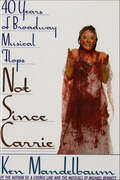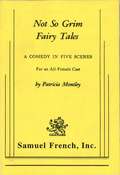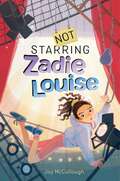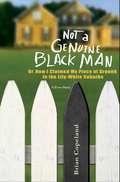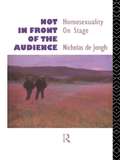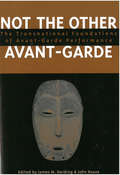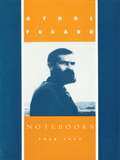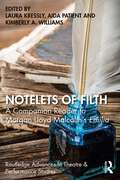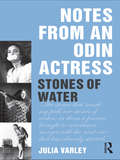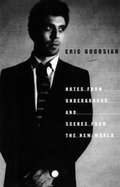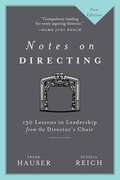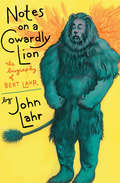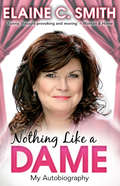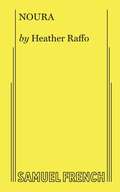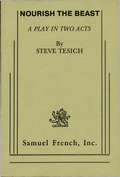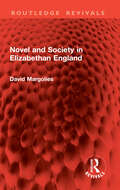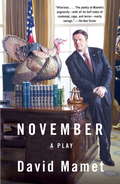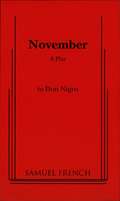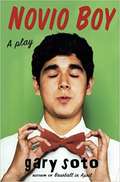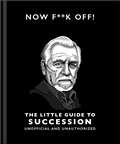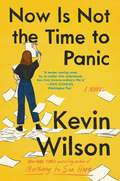- Table View
- List View
Not Since Carrie: 40 Years of Broadway Musical Flops
by Ken MandelbaumThe “essential and hilarious” book that highlights almost 200 musicals and examines how they became Broadway’s biggest fails (The New Yorker).Ken Mandelbaum offers the behind-the-scenes story of the development of almost two hundred musical flops that played Broadway between 1950 and 1990, along with a reevaluative and often revisionist study of their quality. Here they all are, from such legendary catastrophes as Carrie, Kelly, Breakfast at Tiffany’s, and Legs Diamond, to flops that starred Lucille Ball and Bette Davis, to the failures of Rodgers and Hammerstein, Jule Styne, Jerry Herman, Alan Jay Lerner, Gower Champion, and many others.Not Since Carrie makes a case for the strengths of certain unsuccessful works, points out some that might be worthy of revival, and allows the reader to relive some of Broadway’s most infamous moments. A reexamination of neglected, forgotten, and often catastrophic musicals, Not Since Carrie will remain the definitive volume on a colorful and vital segment of “lost” theatre history.“Highly readable . . . As befits the subject, Not Since Carrie is full of entertaining backstage reportage . . . The illustrations are also fun and wittily chosen, whether embarrassing production photos or sadly hopeful posters and advertising.” —Frank Rich, The New York Times/WQXR“Breathtaking research and pointed, but not cruel, wit.” —David Patrick Stearns, USA Today“Of all the theater books I’ve come across lately, none has entertained me more than Ken Mandelbaum’s Not Since Carrie, a lively, illustrated account of forty years of Broadway musical flops.” —Doug Watt, New York Daily News
Not Since Carrie: Forty Years of Broadway Musical Flops
by Ken MandelbaumIf you love Broadway musicals, this book is for you. While Broadway has had its share of musical triumphs, it has also seen hundreds of musicals that had brief runs, lost millions of dollars, and broke the hearts of their creators and performers. For every hit musical, there are roughly five others that are quick flops, and even the most celebrated names in show business are not immune to them. Ken Mandelbaum offers the behind-the-scenes story of the development of almost two hundred musical flops that played Broadway between 1950 and 1990, along with a reevaluative and often revisionist study of their quality. Here they all are, from such legendary catastrophes as Carrie, Kelly, Breakfast at Tiffany’s, and Legs Diamond, to flops that starred Lucille Ball and Bette Davis, to the failures of Rodgers and Hammerstein, Jule Styne, Jerry Herman, Alan Jay Lerner, Gower Champion, and many others. Not Since Carrie makes a case for the strengths of certain unsuccessful works, points out some that might be worthy of revival, and allows the reader to relive some of Broadway’s most infamous moments. A reexamination of neglected, forgotten, and often catastrophic musicals, Not Since Carrie will remain the definitive volume on a colorful and vital segment of "lost” theatre history. Ken Mandelbaum has written on musical theatre for The New York Times, Playbill, Stagebill, Billboard, Show Music, and Sony/Columbia Records. He is currently the musical theatre critic for Theater Week magazine. In 1989, he won acclaim for his first book, A Chorus Line and the Musicals of Michael Bennett (St. Martin’s Press). He lives in New York City, and his favorite song is "I Wish It So” from the flop Juno. If you subscribe to a music service like Amazon or Spotify, you can listen to many of the songs described. At the end of the book there is a Shows Index and a Names Index.
Not So Grimm Fairy Tales
by Patricia MontleySatire / 15f (doubling possible) / Bare stage / Five scenes present unusual variations on familiar tales. In Little Red and the Big Bad She Wolf Red is invited by Mae Wolf to quit Harvard Business School and get a start in the service selling business despite Granny's opposition (she is Mae's senior partner). In Bumble Stiltskin and the Baby Business Rumpel's put upon wife implores the Queen to keep her royal baby and offers to set up a Day Care Center if she gets government support. Also included are Snow White and the Anti Freeze, Jack and the Marijuana Stalk and Cinderella.
Not Starring Zadie Louise
by Joy McCulloughIn this &“entertaining and moving&” (Kirkus Reviews) middle grade novel that&’s perfect for fans of Tim Federle and Gordon Korman, Zadie is determined to spend the summer helping at the community theater—but things go hilariously awry!Zadie loves Tae Kwon Do, comic books, and outer space. She also loves visiting the community theater that her mom runs, especially the lighting grid over the stage and the stage manager&’s booth, which is filled with levers and buttons like a spaceship control panel. So when the family&’s finances suffer a blow and Zadie has to give up her usual activities to spend the summer at the theater, she doesn&’t mind too much. After all, she&’s always wanted to tech a show. She knows she&’d be great at it, but her mom and the new stage manager are totally opposed to the idea of having a kid do tech. Instead, Zadie&’s stuck handing out snacks and folding flyers. But the future of the theater rides on this show, and Zadie is determined to help. She&’s going to make Spinderella the hit of the season—unless she accidentally turns it into a disaster.
Not a Genuine Black Man: Or, How I Claimed My Piece of Ground in the Lily-White Suburbs
by Brian CopelandBased on the longest-running one-man show in San Francisco history--now coming to Off-Broadway--a hilarious, poignant, and disarming memoir of growing up black in an all-white suburb In 1972, when Brian Copeland was eight, his family moved from Oakland to San Leandro, California, hoping for a better life. At the time, San Leandro was 99.4 percent white, known nationwide as a racist enclave. This reputation was confirmed almost immediately: Brian got his first look at the inside of a cop car, for being a black kid walking to the park with a baseball bat. Brian grew up to be a successful comedian and radio talk show host, but racism reemerged as an issue--only in reverse--when he received an anonymous letter: "As an African American, I am disgusted every time I hear your voice because YOU are not a genuine Black man!" That letter inspired Copeland to revisit his difficult childhood, resulting in a hit one-man show that has been running for nearly two years--which has now inspired a book. In this funny, surprising, and ultimately moving memoir, Copeland shows exactly how our surroundings make us who we are.
Not in Front of the Audience: Homosexuality On Stage
by Nicholas de JonghFirst published in 1992. Routledge is an imprint of Taylor & Francis, an informa company.
Not the Other Avant-Garde: The Transnational Foundations of Avant-Garde Performance
by John Rouse James Martin HardingAlmost without exception, studies of the avant-garde take for granted the premise that the influential experimental practices associated with the avant-garde began primarily as a European phenomenon that in turn spread around the world. These ten original essays, especially commissioned for Not the Other Avant-Garde, forge a radically new conception of the avant-garde by demonstrating the many ways in which the first- and second-wave avant-gardes were always already a transnational phenomenon, an amalgam of often contradictory performance traditions and practices developed in various cultural locations around the world, including Africa, the Middle East, Mexico, Argentina, India, and Japan. Essays from leading scholars and critics-including Marvin Carlson, Sudipto Chatterjee, John Conteh-Morgan, Peter Eckersall, Harry J. Elam Jr., Joachim Fiebach, David G. Goodman, Jean Graham-Jones, Hannah Higgins, and Adam Versényi-suggest collectively that the very concept of the avant-garde is possible only if conceptualized beyond the limitations of Eurocentric paradigms. Not the Other Avant-Garde is groundbreaking in both avant-garde studies and performance studies and will be a valuable contribution to the fields of theater studies, modernist studies, art history, literature, and music history.
Notebooks
by Athol Fugard"Fugard registers and captures the keen images that are the very stuff of vibrant theatre."--Time
Notelets of Filth: A Companion Reader to Morgan Lloyd Malcolm's Emilia (Routledge Advances in Theatre & Performance Studies)
by Morgan Lloyd Malcolm Aida Patient Kimberly A. Williams Laura KresslyThis collection of short, accessible essays serves as a supplementary text to Morgan Lloyd Malcolm’s play, Emilia. Critically acclaimed and beloved by audiences, this innovative and ground-breaking show is a speculative history, an imaginative (re)telling of the life of English Renaissance poet Aemilia Bassano Lanyer. This book features essays by theatre practitioners, activists, and scholars and informed by intersectional feminist, critical race, queer, and postcolonial analyses will enable students and their teachers across secondary school and higher education to consider the play’s major themes from a wide variety of theoretical and interdisciplinary perspectives. This volume explores the current events and cultural contexts that informed the writing and performing of Emilia between 2017 and 2019, various aspects of the professional London productions, critical and audience responses, and best practices for teaching the play to university and secondary school students. It includes a foreword by Emilia playwright Morgan Lloyd Malcolm This book will be of great interest to students and scholars of theatre, arts activism, feminist literature, and theory.
Notes From An Odin Actress: Stones of Water
by Julia Varley‘As an actress I sit, speak, run, sweat and, simultaneously, I represent someone who sits, speaks, runs and sweats. As an actress, I am both myself and the character I am playing. I exist in the concreteness of the performance and, at the same time, I need to be alive in the minds and senses of the spectators. How can I speak of this double reality?’ – Julia Varley This is a book about the experience of being an actress from a professional and female perspective. Julia Varley has been a member of Odin Teatret for over thirty years, and Notes from an Odin Actress is a personal account of her work with Eugenio Barba and this world-renowned theatre company. This is a unique window onto the in-depth exercises and day-to-day processes of an Odin member. It is a journal to enlighten anyone interested in the performances, the discoveries and the hard physical work that accompany a life in theatre.
Notes From Underground
by Eric BogosianIncludes Bogosian's Notes from Underground, the "diary," of an increasingly disturbed and disturbing urban recluse, together with Scenes from the New World, an early dramatic work.
Notes On Directing: 130 Lessons In Leadership From The Director's Chair
by Frank Hauser Russell ReichSome years ago, Frank Hauser, then a retired freelance director, and writer Russell Reich, his former student, self-published Notes on Directing in hardcover. It was immediately acclaimed as “a gem-witty and full of insight;” “so sensible, so complete, and so right;” and “amazingly illuminating” by the likes of Judi Dench, Edward Albee, and Terry Teachout. Gathered over Frank Hauser's long career, and polished to a sharp edge by Russell Reich, the 130 "Notes" address a wide range of topics, from understanding the script and defining the director's role, to casting, how to handle a first read-through of a script, rules for rehearsal, how to talk to actors, how to get a laugh, and the key elements of staging. Filled with enduring good advice expressed in assertive, no-nonsense language, and supported with explanatory commentary, insightful quotes and examples, and six valuable appendices, this deceptively slim book has the impact of a privileged apprenticeship, providing deep insight into the hidden process of creating a live, shared experience. For the student or professional engaged in a directing or acting career, the executive or manager looking for inspiring new ideas on leadership, or the arts lover wanting insight into the creative process, this book will be an invaluable experience. This new edition includes an interview with the co-author.
Notes from the Field
by Anna Deavere SmithAnna Deavere Smith’s extraordinary form of documentary theater shines a light on injustices by portraying the real-life people who have experienced them. In Notes from the Field, she renders a host of figures who have lived and fought the system that pushes students of color out of the classroom and into prisons. (As Smith has put it: “Rich kids get mischief, poor kids get pathologized and incarcerated.”) Using people’s own words, culled from interviews and speeches, Smith depicts Rev. Jamal Harrison Bryant, who eulogized Freddie Gray; Niya Kenny, a high school student who confronted a violent police deputy; activist Bree Newsome, who took the Confederate flag down from the South Carolina State House grounds; and many others. Their voices bear powerful witness to a great iniquity of our time—and call us to action with their accounts of resistance and hope.
Notes on a Cowardly Lion: The Biography of Bert Lahr
by John LahrJohn Lahr&’s stunning and complex biography of his father, the legendary actor and comedian Bert Lahr Notes on a Cowardly Lion is John Lahr&’s masterwork: an all-encompassing biography of his father, the comedian and performer Bert Lahr. Best known as the Cowardly Lion in MGM&’s classic The Wizard of Oz, Lahr was a consummate artist whose career spanned burlesque, vaudeville, Broadway, and Hollywood. While he could be equally raucous and polished in public, Lahr was painfully insecure and self-absorbed in private, keeping his family at arm&’s length as he quietly battled his inner demons. Told with an impressive objectivity and keen understanding of the construction—and destruction—of the performer, Notes on a Cowardly Lion is more than one man&’s quest to understand his father; it is an extraordinary examination of a life in American show business.
Nothing Like a Dame: My Autobiography
by Elaine C Smith'How did I end up here?' A question Elaine C. Smith asked herself when sitting in the dressing-room of a top theatre in London's West End, about to go on stage with one of the UK's most successful plays.In Nothing Like a Dame, Elaine reflects on a 50-year journey that took her to the peak of the entertainment world. She recounts her long struggle to make it in a male-dominated, working-class society when women were supposed to just shut up and stay thin, especially in the sexist world of theatre and television, where she was told, 'Look, women just aren't funny.'Despite many highs and lows, she proceeded to forge a stellar career in show business, hosting her own TV series and becoming a household name thanks to her comic portrayal of Mary Nesbitt, the long-suffering wife in the award-winning BBC comedy Rab C. Nesbitt.Nothing Like a Dame is a heart-warming memoir: candid, outspoken, hilarious and at times deeply sad.
Noura
by Heather RaffoAs Noura and her husband Tariq prepare to celebrate a traditional Christmas, she looks forward to welcoming a special guest—Maryam, a young Iraqi refugee. But the girl’s arrival opens wounds the family has tried to leave behind, forcing them to confront where they are, where they’ve been and who they have become.
Nourish the Beast
by Steve TesichComedy / 7m, 2f / Interior / Baba Goya is a loudmouth mother who goes through husbands and orphans like the Turkish coffee she makes in a dirty old soup pan. In Queens she presides over a household comprised of a childish orphan who happens to be a cop, an elderly gentleman who explodes every time somebody calls him grandpa, a dying husband and an errant daughter who cries all night. The husband, Baba's fifth, is already submitting an ad for her sixth. The cop catches a Japanese stealing cameras and chains him to a radiator, the daughter guiltily confesses she voted for Nixon and runs off, and the husband, who may not die after all, insists they must wait out Watergate for a Democratic.
Novel and Society in Elizabethan England (Routledge Revivals)
by David MargoliesThe Elizabethans witnessed not only a great flowering of drama, but also a flourishing of fiction and the development of a literary entertainment business. Printing made possible a wide distribution of cheap books that found an audience in all sections of society. The large, new literary market enabled the presentation of different social viewpoints and encouraged an alternative to ‘official’ ideology. First published in 1985, Novel and Society in Elizabethan England presents a whole range of English fiction of the period against its social background. It considers the major authors of prose fiction—John Lyly, Philip Sidney, Thomas Nashe, Robert Greene, and Thomas Deloney—and examines how they organised their works for audiences with a specific social perspective.In taking a functional view of literature, treating the novels not as static literary artefacts but in terms of their social role, Margolies redefines the idea of literary value. He offers a new, coherent view of the major figures of the Elizabethan novel, which should challenge the thinking of students of the novel and the age of Shakespeare.
November
by David MametDavid Mamet's new Oval Office satire depicts one day in the life of a beleaguered American commander-in-chief. It's November in a Presidential election year, and incumbent Charles Smith's chances for reelection are looking grim. Approval ratings are down, his money's running out, and nuclear war might be imminent. Though his staff has thrown in the towel and his wife has begun to prepare for her post-White House life, Chuck isn't ready to give up just yet. Amidst the biggest fight of his political career, the President has to find time to pardon a couple of turkeys -- saving them from the slaughter before Thanksgiving -- and this simple PR event inspires Smith to risk it all in attempt to win back public support. With Mamet's characteristic no-holds-barred style, November is a scathingly hilarious take on the state of America today and the lengths to which people will go to win.From the Trade Paperback edition.
November (Nigro)
by Don NigroComedy / 3m, 6f / Unit Set / In the autumn of 1980, Aunt Liz is trapped in a nursing home in the hilly agricultural country of east Ohio while her niece Becky and Becky's revolting husband try to steal and destroy her farm. Her life is further complicated by a harried but sympathetic young nurse, her nomadic nephew, a bewildered friend, and her sisters cranky Molly and Dorothy, a deaf mute piano player. Memories of her beautiful and long dead Jessie also intrude, as well as her outrageous fellow inmate, Mr. Kafka, who tries to teach her about muskrat traps and immortality. This funny and moving play was first produced with great success at Capital Rep in Albany; it has particularly rich roles for a mature cast. November is part of the author's cycle of Pendragon Plays; fans will recognize some of the characters from other plays in the series.
Now F**k Off!: The Little Guide to Succession
by Orange Hippo!In January 2024, Succession won four Golden Globes - including Best Drama - from a record 13 nominations, cementing the truth in stone: no other show since The Sopranos has come close to its influence, impact and intelligence. Fuelled by the uncertainty of the global pandemic and the ugly political aftermath of the 2016 and 2020 U.S. elections, Succession's premise is simple but devastating: rip a despicable yet powerful family apart using jaw-droppingly innovative and original one-liners, led by a wealth of top TV talent.The Little Guide to Succession is an essential and hilarious read for fans of the Roy family and the rest of the business class ensemble's infamous and now-iconic wicked wit and quickfire quips. All the best quotes here, ready to be deployed at your command from this compact celebration of Succession."You can't make a Tomlette without breaking some Gregs."Tom, to Greg (emailed to Greg 67 times in one evening), season two, episode nine, "DC"."You're a clumsy interloper, no one trusts you and the only guy pulling for you is dead. Now you're just married to the ex-boss's daughter and she doesn't even like you. You are fairly, squarely fucked."Karl, to Tom, when he "respectfully" threw his hat into the ring for interim CEO, season four, episode four, "Honeymoon States"."You look like a dildo dipped in beard trimmings."Roman, to designer-stubbled Stewy, season two, episode two, "Vaulter".3,021The number of times the word "fuck" is said throughout the show's four seasons. That's an average of 76 "fucks" per episode, or one every 1.2 minutes.
Now F**k Off!: The Little Guide to Succession
by Orange Hippo!In January 2024, Succession won four Golden Globes - including Best Drama - from a record 13 nominations, cementing the truth in stone: no other show since The Sopranos has come close to its influence, impact and intelligence. Fuelled by the uncertainty of the global pandemic and the ugly political aftermath of the 2016 and 2020 U.S. elections, Succession's premise is simple but devastating: rip a despicable yet powerful family apart using jaw-droppingly innovative and original one-liners, led by a wealth of top TV talent.The Little Guide to Succession is an essential and hilarious read for fans of the Roy family and the rest of the business class ensemble's infamous and now-iconic wicked wit and quickfire quips. All the best quotes here, ready to be deployed at your command from this compact celebration of Succession."You can't make a Tomlette without breaking some Gregs."Tom, to Greg (emailed to Greg 67 times in one evening), season two, episode nine, "DC"."You're a clumsy interloper, no one trusts you and the only guy pulling for you is dead. Now you're just married to the ex-boss's daughter and she doesn't even like you. You are fairly, squarely fucked."Karl, to Tom, when he "respectfully" threw his hat into the ring for interim CEO, season four, episode four, "Honeymoon States"."You look like a dildo dipped in beard trimmings."Roman, to designer-stubbled Stewy, season two, episode two, "Vaulter".3,021The number of times the word "fuck" is said throughout the show's four seasons. That's an average of 76 "fucks" per episode, or one every 1.2 minutes.
Now Is Not the Time to Panic: A Novel
by Kevin WilsonNATIONAL BESTSELLERNamed a Best Book of the Year by: Time * Kirkus Reviews * USA Today * Entertainment Weekly * Garden & Gun * Vox * Atlanta Journal-ConstitutionA Most Anticipated Book of Fall from: Associated Press * Atlanta Journal-Constitution * BookPage * Book Riot * The Boston Globe * Entertainment Weekly * Esquire * Garden & Gun * LitHub * St. Louis Post-Dispatch * Sunset Magazine * Time * Town & Country * The Millions * USA Today * Vogue * Vulture * The WeekAn exuberant, bighearted novel about two teenage misfits who spectacularly collide one fateful summer, and the art they make that changes their lives foreverSixteen-year-old Frankie Budge—aspiring writer, indifferent student, offbeat loner—is determined to make it through yet another summer in Coalfield, Tennessee, when she meets Zeke, a talented artist who has just moved into his grandmother’s house and who is as awkward as Frankie is. Romantic and creative sparks begin to fly, and when the two jointly make an unsigned poster, shot through with an enigmatic phrase, it becomes unforgettable to anyone who sees it. The edge is a shantytown filled with gold seekers. We are fugitives, and the law is skinny with hunger for us.When the posters begin appearing everywhere, people wonder who is behind them and start to panic. Satanists? Kidnappers? The rumors won’t stop, and soon the mystery has dangerous repercussions that spread far beyond the town.Twenty years later, Frances Eleanor Budge gets a call that threatens to upend her carefully built life: a journalist named Mazzy Brower is writing a story about the Coalfield Panic of 1996. Might Frances know something about that?A bold coming-of-age story, written with Kevin Wilson’s trademark wit and blazing prose, Now Is Not the Time to Panic is a nuanced exploration of young love, identity, and the power of art. It’s also about the secrets that haunt us—and, ultimately, what the truth will set free.
